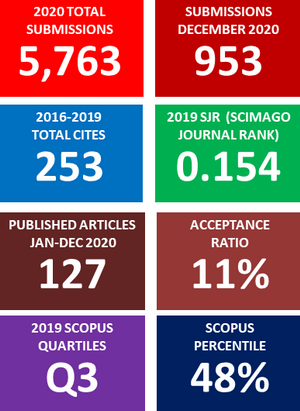The Relationship of Cyber-bullying and Academic Achievement, General Health, and Depression in Adolescents in Thailand
DOI:
https://doi.org/10.48048/wjst.2019.4059Keywords:
Cyberbullying, academic achievement in adolescents, general health, depression in adolescentsAbstract
This descriptive study aimed to correlate cyber bullying with academic achievement, general health, and depression among adolescents in Thailand. The participants in the study were composed of 400 senior high school and vocational certificate students aged 14 to 20 years. The results revealed that one-third of the participants were found to have been bullied (39.0 %). Furthermore, cyberbullying was correlated with academic achievement, general health, and depression among adolescents with a statistical significance of 0.01 (rpb = 0.858, p < 0.01; rpb = 0.584, p < 0.01; rpb = 0.532, p < 0.01). Based on the findings, the following recommendations are suggested. As cyberbullying can be seen as a significant factor correlated with academic achievement, general health, and depression among adolescents, all people involved (families, schools, communities, and society) need to have awareness of, and place importance on, protecting and caring for children in the use of online social media within proper boundaries. Beginning with families, parents should place importance on speaking with adolescents about the problems or issues confronted by them at home and in school, and they should know how to observe the positive and negative changes in behavior among adolescents in order to help them search for guidelines to provide suitable and timely help for them. Most importantly, adolescents should be taught to be aware of the positive and negative impacts of their cyberbullying actions.
Downloads
Metrics
References
J Donner. Research approaches mobile use in the developing world: A review of the literature. Inform. Soc. 2010; 24, 140-59.
P Saipradit. Internet Users in Providing Integrated Media. Available at: http://www.nectec.or.th. accessed January 2015.
P Boonmongkon, R Iaumsrie, S Tounpananan, T Ojanen, R Samakkeekarum, R Samua, R Shunrun, T Guadamuz and Payukkakom. Gender, Sexuality, and cyberbullying of teen girls in Thailand. In: Proceeding of the Conference on Health Sciences 2012. Mahidol University, Bangkok, Thailand.
S Shariff. Cyberbullying: Issues and solutions for the school, the classroom, and the home. Oxon, Routledge, UK, 2008.
F Dehue, B Catherine and Trijntje. Cyberbullying: Youngsters’ experiences and parental perception. Cyberpsychol. Behav. 2008; 11, 217-23.
RS Tokunaga. Following you home from school: A critical review and synthesis of research on cyberbullying victimization. Comput. Human. Behav. 2010; 26, 277-87.
W Musikpan, S Pokpong, N Songsiri and P Surut. Cyberbullying Behavior of Adolescent in Bangkok Thailand. The Wisdom Society for Public Opinion Research of Thailand, Bangkok, Thailand, 2009.
S Bauman, R Toomey and J Walker. Associations among bullying, cyberbullying, and suicide in high school students. J. Adolesc. 2013; 36, 341-50.
C Helen. Cyberbullying and its impact on young people’s emotional health and well-being. Psychiat. 2013; 37, 167-70.
S Perren and GH Eveline. Cyberbullying and traditional bullying in adolescence: Differential roles of moral disengagement, moral emotions, and moral values. Eur. J. Dev. Psychol. 2010; 9, 195-209.
MK Robin and PL Susan. Psychological, physical, and academic correlates of cyberbullying and traditional bullying. J. Adolesc. Health 2013; 53, s13-s20.
O Rosario, E Paz, AM Joaquin, G Luisa, B Antonella, G Annalisa, KS Peter, T Fran and T Neil. The emotional impact of bullying and cyberbullying on victims: A European cross-national study. Aggress. Behav. 2012; 38, 342-56.
AM Schenk, WJ Fremouw and CM Keelan. Characteristics of college cyberbullies. Comput. Human. Behav. 2012; 29, 2320-7.
T Nilchaikovit, C Sukying and C Silpakit. The Project of Preparing a Program to Explore Mental Health in the Area in 1992. Department of Mental Health, Ministry of Public Health, Thailand, 1992.
U Trangkasombat and D Likanapichitkul. The children’s depression inventory as a screen for depression in Thai children. J. Med Assoc. Thailand 1997; 80, 491-9.
N Samoh, P Boonmongkon, T Ojanen, R Samkkeekarom and T Guadamuz. Youth perceptions on cyberbullying. J. Behav. Sci. Develop. 2014; 6, 351-63.
M Price and J Dalgleish. Cyberbullying experiences, impacts and coping strategies as described by Australian young people. Youth Stud. Aust. 2010; 29, 51-9.
Downloads
Published
How to Cite
Issue
Section
License
Copyright (c) 2018 Walailak Journal of Science and Technology (WJST)

This work is licensed under a Creative Commons Attribution-NonCommercial-NoDerivatives 4.0 International License.













